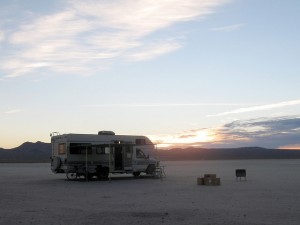
It’s close to 6a and I’ve been awake for an hour – nervous about the move taking place over the next two days to my new home.
It’s not like moving before where I’m going to a house or apartment – this time it’s to a house on wheels. It’s a novel transition some people thought was kind of cool and truth be told it has been a dream of mine finally accomplished.
RV living is not for everyone and adjustments not only mentally but spiritually must be made. You have to harness the emotion that this is the last real freedom you can have – the ability to disconnect, turn a key and roll off down the asphalt to destinations unknown.
For months I have read everything I can find online and on YouTube.com about van and RV living. It’s a sense of self purpose in being able to live free from the confines of city norms.
The tiny house and RV movements are enormously popular with thousands of new converts every month going mobile in their living accommodations. The ability for younger mobile dwellers to live and work from anywhere has revolutionized how we think and often work. We older RVer’s like our comforts and some have retirement money or social security to maintain this nomadic lifestyle.
The more economic minded folks have chosen a brazen new adventure and boondock (staying for free with no connections) in RV friendly places each night Wal-mart parking lots and other RV friendly places are being discovered by intrepid adventurers. Sometimes it’s all about economy when choosing to spend $20 a day in a RV Park or campground just doesn’t fit your budget and that $600+ each month can allow you to travel an extra 2,000 miles a month seeing the sights and experiencing the beauty that is found around every bend in this great nation of ours.
While boondocking does sound feasible to me it somehow takes away from the camaraderie you can experience in an RV Park or campground filled with likeminded folks enjoying a lifestyle of mobile freedom.
When I was a kid my family used to take road trips to Michigan, Oklahoma and other places to visit relatives for a week. Staying with aunts and uncles was kind of cool and as a kid I always had new playmates and got to experience what a new state and city was like. My favorite was visiting relatives in Texas on a sprawling ranch of more than a thousand acres with horses, cattle and a huge pond full of fish.
 Well I’m no longer a kid and my child is all grown with a family of his own too. So the opportunity to visit relatives is nice sounding I think I’d rather not interrupt their lives and daily routines and go visit the mountains, oceans and Great Plains all by my lonesome with no expectations, time constraints or encumbrances.
Well I’m no longer a kid and my child is all grown with a family of his own too. So the opportunity to visit relatives is nice sounding I think I’d rather not interrupt their lives and daily routines and go visit the mountains, oceans and Great Plains all by my lonesome with no expectations, time constraints or encumbrances.
One of the repeat questions I’ve been asking is about RV rig miles per gallon and I have asked everyone from Class A 45’ behemoths to the Class B van dwellers and often the response is about the same “it varies on how I drive” – to me that is not an answer so I kept asking and overall I got a better response I’d like to share.
Those stats are not surprising but here is what I have been told and found in my research:
Class A motor homes: 7-10 mpg
Class C motor homes: 7-12 mpg
Class B motor homes: 12-20 mpg
And last but not least those mobile adventurers with towable trailers and campers: 8 – 12 mpg.
Yes I know that is a subjective means of knowing what I am getting into but I had to start somewhere and my curiosity got the best of me.
This “false gas economy” will not last and I foresee the days of $3 a gallon fuel returning and those rabid highways runners who boondock nightly in an effort to feed their fuel tanks will feel the sting too.
My own adventures will be as an ‘economy traveler’ too. It’s not that I would mind staying in a campsite with hookups but for me it’s impractical having to pull in, pay whatever fees are required, maneuver in tight confines, get out hook up water, sewer and power for one or two nights and maybe drop $100 – no thanks.
The normal Class A motor coach (like mine) averages 7-10 mpg have 60-100 gallon fuel tanks and parking that beast in a camp ground overnight often has length limitations and fees are $20-$50 a day with connections and power. Parking eats up your budget in campgrounds and RV Parks while traveling and staying in facilities costs $600 – $900+ a month alone – yikes.
I investigated using national truck stop chins like Flying-J, Pilot, TA and others, Wal-Mart, Camping World, Cracker Barrel and casino parking lots to boondock or dry camp overnight for FREE – it saves money and in either place you have access to a restroom, internet and food services so you save a lot of money but still have use of amenities and an opportunity to stock up or have a sit down breakfast before you hit the highway to your next stop.
Using these FREE facilities it’s easy to pull into a space away from the store or from commercial trucks for a night’s sleep. In truck stops these rigs are running constantly and getting acclimated to the noise is something some RV dweller just cannot do and parking like this just requires a little ingenuity. I enjoy going target shooting and went to Bass Pro and found the best ear plugs I could buy that was for me Ear Pro by Surefire Sonic 4 for comfort when shooting or laying down will not interfere with your head comfort and for $15 it’s an inexpensive means to cope with truck stop noise to get a good night’s sleep.
What I thought would be deterrent and a huge cost in order to travel and have a nomadic lifestyle was fuel but it’s not as though you are driving 500-600 miles a day instead 150-250 mile jaunts, staying overnight or a few days exploring the area before moving on to your next stop.
I’m thinking travel should be an adventure to interesting places you have never been. I discovered looking at RV maps most of these interesting places are within 150 miles from one another and the average time an RVer spends is 3-5 days and over two weeks you can burn up a tank of gas ($160), explore the FREE stuff during the day and allow for entertainment like beer break each day at the local tavern or American Legion which every town has one ($4), meals at home in the rig will cost whatever your normal monthly food costs are – ($150-$200) and maintenance every two weeks such as tires, propane, oil, antifreeze and whatever other things need cared for ($25). I figure on the road I’ll burn up $700 a month.
It isn’t FREE living but its living.
Now that I’m over 60 where the next adventure may take place is still a mystery but it’s season here in sunny Florida and the snowbirds are flocking to escape the coming snow and freezing temperatures of the northern winters and the RV Park where I live will be full up but it too will be a new adventure and I hope full of friends yet unknown.








